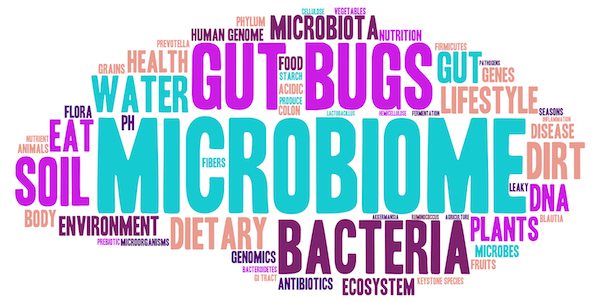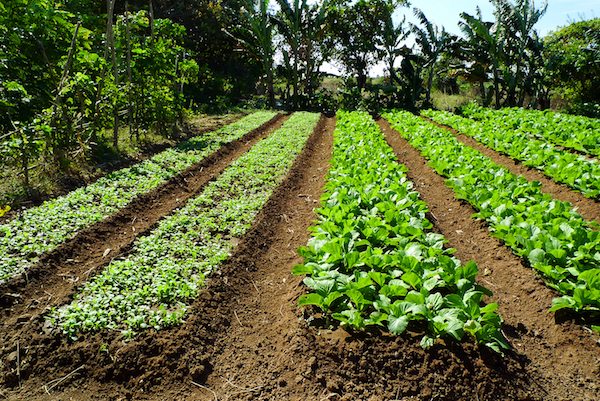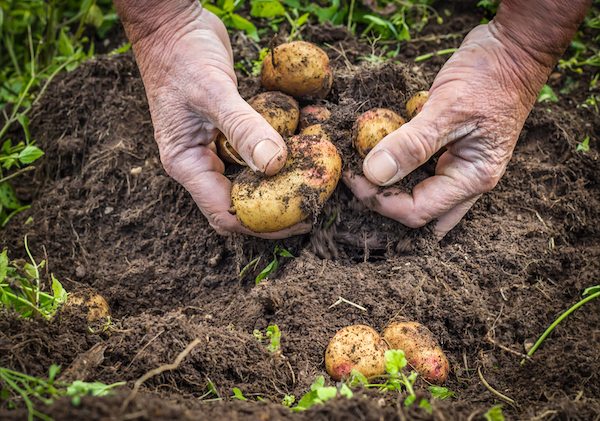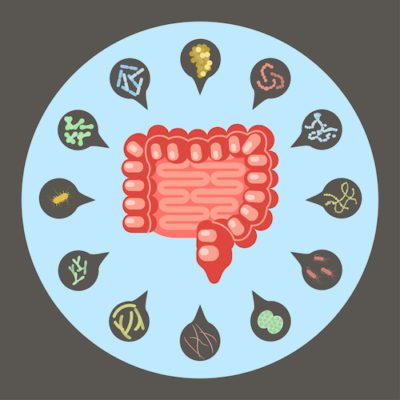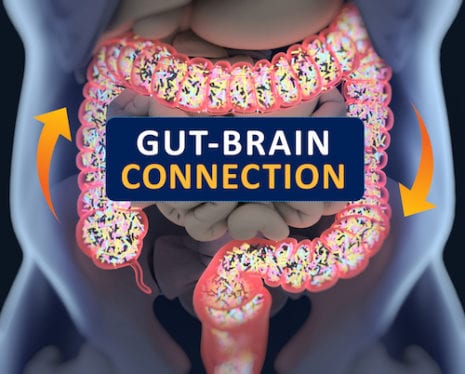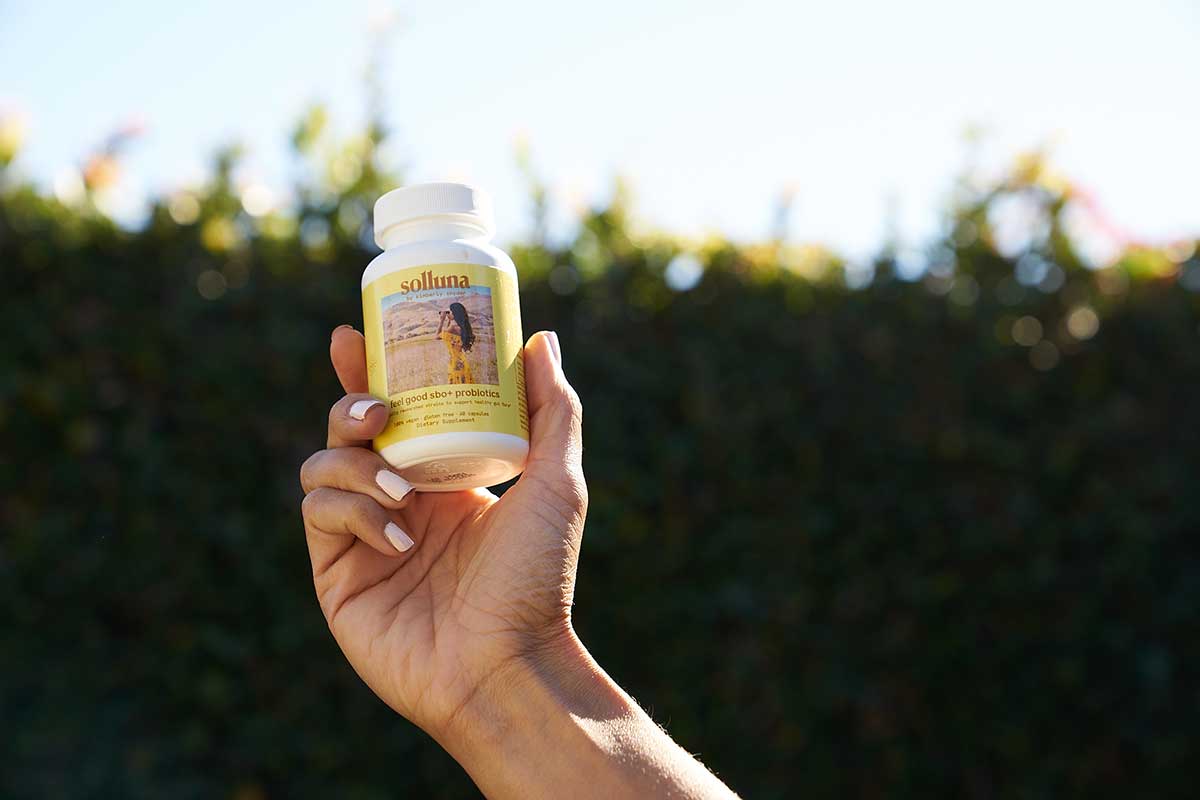Interest in the benefits of probiotics has skyrocketed in recent years, and for good reason. Research has linked the gut microbiome to a variety of physical diseases and even mental disorders. Exposure to a wide range of bacteria, especially during infancy and childhood, appears to build a healthy immune system [1].
Recent research suggests that a lack of these beneficial bacteria may contribute to a weakened immune system and digestive disorders. Probiotics are formulations that contain healthy gut bacteria to replace or improve our digestive microorganisms.
There are many probiotics available, and most can be grouped into two categories; regular probiotics (cultivated from dairy), and non-dairy probiotics or soil based organisms (SBO probiotics).
What are Soil Based Probiotics (SBOs)?
Soil based probiotics (SBOs) are bacterial microorganisms that are necessary for a healthy gut microbiome. Some strains of bacteria are especially important in supporting various aspects of our physical and mental health.
Soil Based Probiotics (SBOs) are “Good Bacteria” with Many Physical & Mental Health Benefits:
- Aid in digestion
- Assist in nutrient absorption
- Support a healthy immune system by triggering antibodies that act as our main defenders.
- Support healthy energy levels
- Support mood and mental health
SBOs Have Been Used for Thousands of Years
Our earliest ancestors were exposed to a large number of bacteria through the way they lived and ate. To improve our health in present times, it’s important to learn the lessons from our past. Here are examples of how our ancestors were exposed to SBOs for natural gut health.
- Prior to modern agricultural, the diet consisted primarily of wild plant foods; vegetables, roots, fruit and berries gathered from bushes, trees, and from the ground.
- The food was eaten as it was found, without washing.
- Soil based bacteria would have been on anything that had contact with the ground. Roots, low growing leaves, and any fruits that fell to the ground would have soil based bacteria. Even people’s hands would have soil-based bacteria from having contact with dirt and they probably didn’t wash their hands multiple times a day as we do in modern times. The bacteria was ingested along with the food, and traveled to the digestive tract where it colonized the human gut and supported a symbiotic relationship humans shared with the bacteria.
- This continued contact ensured a continuous supply of the bacterial spores naturally found in the soil.
Pre-modern humans were well adapted to bacteria encountered in their world. Soil in this pre-agricultural era was rich in numerous strains of soil microbes. Modern conventional farming practices utilizing pesticides, herbicides and other chemicals have depleted the soil of the valuable microbes and nutrients, like zinc, calcium, and selenium, which are all critical to good health [2].
Besides soil depletion, fruits and vegetables are often sprayed with microbe killing agents and, even if they aren’t, they are washed clean of the beneficial bacteria they had originally.
In 2009, microbiologist M. Gloria Dominguez-Bello along with her research colleagues from New York University School of Medicine and a medical team from the Venezuelan government took a helicopter to a remote Yanomami tribe at the border of Venezuela and Brazil. The tribe had lived as hunter-gatherers for more than 11,000 years in that area of the Amazon rain forest. This was the first time that particular tribe had direct contact with modern society [3].
The research team took samples from the villagers’ fecal matter and analyzed it to figure out which species thrived in the tribe’s guts. They were astonished to find that the tribe had about 50 percent more ecological diversity than the average American has. As cultures around the world become more “Western,” they lose bacteria species in their guts, Dominguez-Bello says.
At the same time, they start having higher incidences of chronic illnesses connected to the immune system, such as allergies, Crohn’s disease, autoimmune disorders and multiple sclerosis. “The concern is that we’re losing keystone species, “ says Dominguez-Bello. One missing microbe helps metabolize carbohydrates. Another communicates with our immune system.
Jens Walter, a microbiologist at the University of Alberta, studied the gut microbes in two indigenous populations in Papua New Guinea. Similarly, he found that the Papua New Guineans’ microbiome had about 47 species that are essentially absent in the Americans they studied [4].
The indigenous Papua New Guineans and the Yanomami tribe have many more species of microbiota than modern humans because, like our earliest ancestors, they are in continual contact with the earth. The foods they eat come directly from the soil and are consumed with much of that soil still present. They don’t fastidiously wash the soil off of their food like we do today.
Their hands would be teeming with soil based organisms (SBOs) and those SBOs would go directly into their mouths as they eat their food with their hands. Their soil also more closely represents the soils of our ancestors, rich in nutrients and bacteria that have not been depleted by commercial farming and other forms of development.
Hopefully studies like these will help us not only identify missing microbe strains but also possibly culture them for reintroduction to our modern microbiome. If there is a link between so many modern day disorders and diseases and the gut microbiome, as evidence suggests, this could be a huge breakthrough for treatment and prevention of many of today’s ills.
What is a Microbiome?
The “gut microbiome” is a collection of many types of bacteria that live in our gastrointestinal tract – also called the digestive tract. This includes the mouth, esophagus, stomach, small intestine, and large intestine. Scientists estimate that we each carry 100 trillion bacteria in our digestive tract alone!
We inherit more than 22,000 genes from our parents. The bacteria that exist in — and on — our bodies contain at least eight million bacterial genes. That’s 360 times more bacterial genes than human genes! The bacteria that we carry inside and outside of the human body are known as the human microbiome [5]
We have a symbiotic relationship with our gut microbiome. We (the host) provide an environment for bacteria to thrive. In return, gut-dwelling bacteria keep pathogens (harmful micro-organisms) in check, aid digestion and nutrient absorption, and contribute to immune function. Soil based probiotics (SBOs) are the most beneficial bacteria for our gut microbiome.
Soil based probiotics (SBOs) are the most beneficial bacteria for our gut microbiome. Discover how my Feel Good SBO + Probiotics will improve your digestion, boost your immunity, and even beautify your skin!
Why Should We Use Soil Based Probiotics (SBOs)?
In 2010, the Human Microbiome Project published an analysis of 178 genomes from bacteria that live in or on the human body. 10,000 different types of bacteria in the human body have been identified, many of which serve functions in human health and disease. The vast numbers of bacteria discovered appear to provide benefit to the human body, not harm [6].
Martin J. Blaser, chairman of the Department of Medicine and a professor of microbiology at the New York University School of Medicine states: “Germs make us sick, but everyone focuses on the harm. It’s not that simple, because without most of these organisms we could never survive” [7].
Further, he adds: “I have been a practicing physician and medical researcher for more than thirty years, and this is the most exciting and important work of my lifetime.”
As scientists map the human microbiome, they are beginning to understand the ecological and evolutionary processes involved in shaping the diversity of the human microbiome. Proper bacterial balance provided by soil based organisms (SBOs) is vital to healthy immune function, providing appropriate protection against potential infections and playing a critical role in the digestion and absorption of food and nutrients [8].
The interaction of multiple strains of soil based bacteria (SBOs) is an essential element in health and wellbeing. Problems arise when we lack the diversity of bacteria. Other types of probiotic formulas are not as hardy or diverse as soil based probiotics (SBOs). Regular probiotics, like acidophilus for example, seldom make it all the way through the digestive tract to the lower intestine to become a part of the crucial microbial community. The natural microbiome that kept our ancestors healthy came from soil based organisms (SBOs).
The latest hypothesis that researchers are investigating, is that allergies are on the rise due to a lack of bacterial diversity in our environments and therefore in our digestive tracts. With people spending more time indoors and less and less time outside in nature, we are being exposed to far fewer species of soil based bacteria (SBOs). This is unfortunate given what we now understand about bacteria being absolutely vital for so many aspects of our health.
The bacteria that live on our skin and in our mouths, digestive tracts and urinary tracts, all communicate with our immune systems and therefore play a large part in the development and regulation of our immunity. Early exposure to beneficial bacteria is vital to a child’s immune function, and therefore to the prevention of allergies.
Children born via caesarean section have a 60% greater risk of developing allergies due to the lack of exposure to the strains of Lactobacillus present in the vagina and birth canal. Of course, our health is not just determined by how we are born; it is greatly influenced by how babies are nurtured in their first months of life and beyond, into childhood [9].
Babies that are breast-fed are exposed to the 700 different species of bacteria that are present in breast milk. Those bacteria are not replicated in baby formula. Babies with less immunity from fewer strains of bacteria often undergo increased use of antibiotics for childhood illnesses such as tonsillitis and ear infections. Antibiotics administered in the first year of a child’s life have been shown to increase their likelihood of developing an allergy by as much as 50%.
Researchers believe changes in gut bacteria may even affect the brain and personality. Germ-free mice have been shown to be dramatically more anxious and hyperactive than their counterparts with a normal microbiome. They concluded that the presence or absence of intestinal microbiota influences the development of behavior, and is accompanied by neurochemical changes in the brain [10].
More recently, researchers at the University of Cork, looked at whether or not the fear response was altered in mice that were raised in a completely germ-free environment, and therefore had a deficient microbiome.
They found that the amygdala – which is the area of the brain responsible for emotional ‘regulation’, appears to be hyperactive in microbiota deficient subjects. This can lead to an unmodulated response to fearful memories, and therefore create a tendency towards phobias or post-traumatic stress disorders for example.
One of the lead researchers on this study, Dr. John Cryan said: “It is turning upside down how we might develop strategies for fear and anxiety. It is a very exciting time for us’’ [11].
While more work is still needed to fully understand the mechanisms behind the relationship between the microbiota and fear responses, Dr. Cryan said it was likely ‘’that key signals from the gut to the brain act as regulators of the fear response.’’
He added that: “We are very excited about this because it is probably one of the first direct links to fear pathways,” and “We now know that for normal fear responses we need to have appropriate microbes in our gut.”
A healthy microbiota balance can also have a large impact on metabolic processes. The gut microbiome has a definite impact on nutrient acquisition and absorption and overall energy regulation.
Research has pointed to the impact of Firmicutes and Bacteroidetes strains on fat mass and obesity. As fat mass increases so does the release of powerful signaling molecules called cytokines, which are linked to inflammation. Appropriate signaling is essential to maintaining healthy metabolism and, when malfunctioning, could trigger the development of metabolic syndrome [12].
What Kills Good Bacteria in the Stomach?
Most Americans don’t consume enough soil based probiotics (SBOs) in their diet due to modern processed foods, soil depletion, and other environmental factors. On top of that, there are things that will kill off, or heavily burden our good bacteria.
Factors that Affect the Microbiome:
- Prescription antibiotics
- Excessive sugar intake
- Drinking tap water with chlorine and/or fluoride
- Emotional stress
- Exposure to toxins and pesticides
However, the balance of “good” and “bad” bacteria can be altered in two ways. Antibiotics kill both bad and good bacteria in the gut. Basically, anything that kills bacteria kills both good and bad bacteria. Certain disease-carrying bacteria, fungi, parasites, and yeasts can also upset the balance. For example, Helicobacter pylori (H. pylori) can cause ulcers and chronic inflammation (infection) of the stomach. Irritable bowel syndrome, Crohn’s disease, and vaginal infections are all linked with “bad” bacteria [13].
Sugar feeds yeast, which will create a bigger burden on good bacteria to keep the yeast in check. The gut microbiome is a powerful regulator of our stress and anxiety. The more stress the microbiome has to mediate, the more taxed the microbiome becomes [14].
Why are Soil Based Probiotics (SBOs) Better than Other Probiotics?
We have strong evidence of many physical and mental health benefits of probiotics. So why are SBOs a better option than dairy-based probiotics? Let’s take a closer look at what makes SBOs so special.
Unique Characteristics of Soil Based Probiotics:
- Soil based organisms are resistant to the digestive acids of the upper digestive tract and stomach.
- Probiotics not derived from soil are not as stable and often don’t make it to the lower digestive tract where they are the most effective.
- Soil based probiotics have a natural shell that protects the probiotic spore against harm. When soil based probiotics are ingested, they travel all the way to the lower intestine, where they proliferate. Like a seed, warm temperatures and moisture stimulate germination. Soil-based probiotics thrive in the gut, and remain in the digestive tract providing long-term benefit.Though the best types of SBO probiotics are found in the natural environment or “soil”, supplemental probiotics are instead produced in safe, controlled environments, which ensure production of the most beneficial strains.
Why Dairy-Based Probiotics are not as Effective as SBOs
Lactobacillus, acidophilus and bifidobacteria, the bacterial species typically found in yogurt and traditional probiotic supplements, do not have the naturally protective shell that is inherent to all soil based, spore-forming bacteria, so they cannot withstand gastric acids. While these types of bacteria can have benefits, unfortunately very few of these organisms ever reach the lower intestine.
Research has demonstrated that yogurt and other products based on these probiotic strains aren’t as hardy as spore-forming probiotic bacteria. A recent study found that such yogurt products have only minimal effects on gut bacteria. The study involved seven pairs of identical twins. One in each pair ate twice-daily servings of yogurt containing five strains of lactic-acid bacteria. The research team performed DNA sequencing on the bacteria in the twins’ stool samples [15].
They found that the yogurt bacteria did not take up residence in the young women’s guts and there was no evidence the bacteria became part of the microbial community in the intestines. The researchers concluded that the yogurt, heavily fortified with billions of lactic acid probiotic bacteria, had no effect on the women’s health, which mimics similar study results performed with mice.
SBO probiotics have a simple, natural advantage. “Bacterial spores offer the advantage of a higher survival rate during the acidic stomach passage and better stability during the processing and storage of the food product,” writes researcher Johannes Bader, from the Technische Universitat Berlin [16].
Are SBOs Safe to use on a Daily Basis?
Soil based organisms (SBOs) have been used medicinally for many years. One soil based organism, known as Bacillus subtilis, was widely used as an immune stimulator and treatment for digestive disorders in North America during the 1950s and 1960s.
Its popularity declined after the introduction of antibiotics, despite its effectiveness and the fact that it comes with far fewer side effects. It is still widely used today in Germany and other parts of Europe, and a 2011 research study showed that it is also a powerful antifungal, particularly against Candida Albicans [17].
Another new study recruited 44 adults all of whom had IBS (Irritable Bowel Syndrome) with either mild to moderate anxiety or depression. The study participants were divided in to two groups. One group was given a daily dose of the SBO probiotic strain Bifidobacterium longum NCC3001, and the other group were given a daily placebo. After six weeks both groups were subjected to psychological analysis and also Magnetic Resonance Imaging of the brain. Results showed that 64% of participants in the probiotic group saw reduced depression scores of at least two points, compared to only 32% from the placebo group reporting the same improvements [18].
Additionally, results from the MRI testing verified that reductions in depression scores were accompanied by changes in the area of the brain involved in mood regulation.
One of the study authors, Dr. Premysl Bercik commented that: ‘This opens new avenues not only for the treatment of patients with functional bowel disorders but also for patients with primary psychiatric diseases.”
In mouse studies, researchers note the rapid reproduction of the SBO Bacillus subtilis strains and the ability to remain in the intestines becoming a component of the microbiome and further supporting its health and resilience. Mice given a dose of spores excreted more spores than they were given pointing to the fact they germinated and repopulated the gut [19].
In animal applications the use of soil-based probiotics may serve as an alternative to antibiotics, which is important for potentially improving the health of farm animals as well as humans. The lead author of the study, Huynh A. Hong, also notes that spore-form bacteria have been shown to prevent gastrointestinal disorders, “and the diversity of species used and their applications are astonishing” [20].
Unlike regular probiotic lactic acid bacteria (e.g., Lactobacillus), the many SBO Bacillus species have their own cycle of spore-proliferation and spore-release in the gut, says Hong. This activity continues long after the spore-forming bacteria are ingested — creating a truly unique symbiotic relationship with the human host.
Some in-vitro studies have been performed in a laboratory setting, such as a Polish study looking at the antifungal activity of SBO Bacillus. When this strain of bacteria was added to a culture containing the yeast Fusarium, some inhibition of the yeast was noted, suggesting that Bacillus coagulans exerts an antifungal effect. This is especially interesting to think about since yeast infections are a common side effect of treatment with antibiotics. Antibiotics disrupt the gut flora, diminishing populations of “good” bacteria, decreasing our resistance to fungus and other pathogens [21].
A small but impressive 2005 study showed promising results using a multi-strain SBO probiotic and prebiotic formula. This soil based probiotic (SBO) formulation or a placebo was given to 25 IBS patients for two weeks. Their symptoms were detailed one week before the trial started, and then at weekly intervals for three weeks. The three main symptoms of IBS: nausea, indigestion/flatulence and colitis pain all reduced by a statistically significant amount in the probiotic group during this time [22].
This study was then followed up 60 weeks later and the majority of trial participants continued to see some reduction in symptoms, even a year later [23].
Which Probiotics Should you Choose?
There are many different types of strains of probiotics. The health effects experienced by one probiotic may be completely different from the health benefits seen from another probiotic.
Certain strains of probiotics support a healthy immune system. Others are great for digestion and some can help support a healthy metabolism and stabilize moods.
That’s why it’s important to consume a wide range of probiotics in your food or supplement with a good soil based probiotic (SBO) so that you’re covered. My Solluna Feel Good SBO + Probiotics is a unique formula which includes 29 well-researched strains, like Bacillus subtilis, with proven health benefits.
As research continues in this expanding field, further investigation could yield even more powerful data to support the development of novel options to support healthy mood, metabolism, signaling molecules and much more. Dr. Anthony Komaroff, Editor in Chief, Harvard Health Letter, says, “….we are in the early days of a true revolution in medicine. We are discovering that the trillions of microbes that live on or in our bodies (like in the gut) may powerfully promote health. [They] may even influence our risk of many major diseases, including type 2 diabetes, obesity, atherosclerosis, and various brain diseases. Someday doctors may use probiotics to prevent and treat these diseases.”
We have strong evidence for the many physical and mental health benefits of soil based probiotics (SBOs). Most of us no longer have the option of living so close to the soil as our ancestors did. Our modern diets and lifestyles are depleted of necessary soil based probiotics (SBOs). Fortunately, we can now enjoy the benefits of clinically researched, soil based probiotics (SBOs) in Kimberly Snyder’s proven formula.
In love and health,
Kimberly
[1] What Is Gut Microbiota?[2] Micronutrients, Agriculture and Nutrition: Linkages for Improved Health and Well Being
[3] How Modern Life Depletes Our Gut Microbes
[4] The Gut Microbiota of Rural Papua New Guineans: Composition, Diversity Patterns, and Ecological Processes
[5] NIH Human Microbiome Project defines normal bacterial makeup of the body
[6] Human microbiome project: Diversity of human microbes greater than previously predicted
[7] Germs Are Us
[8] Ecological and Evolutionary Forces Shaping Microbial Diversity in the Human Intestine
[9] Cesarean versus Vaginal Delivery: Long term infant outcomes and the Hygiene Hypothesis
[10] Reduced anxiety-like behavior and central neurochemical change in germ-free mice
[11] The microbiome regulates amygdala-dependent fear recall
[12] Gut Microbiota and Its Possible Relationship With Obesity
[13] Getting To Know “Friendly Bacteria”
[14] The microbiome: A key regulator of stress and neuroinflammation
[15] The impact of a consortium of fermented milk strains on the gut microbiome of gnotobiotic mice and monozygotic twins
[16] Spore-forming bacteria and their utilisation as probiotics
[17] Anti-candida effect of bacillomycin D-like lipopeptides from Bacillus subtilis B38
[18] Probiotic Bifidobacterium longum NCC3001 Reduces Depression Scores and Alters Brain Activity: A Pilot Study in Patients With Irritable Bowel Syndrome
[19] The Intestinal Life Cycle of Bacillus subtilis and Close Relatives
[20] The use of bacterial spore formers as probiotics
[21] Study of the antifungal activity of Bacillus vallismortis ZZ185 in vitro and identification of its antifungal components
[22] Prescript-Assist probiotic-prebiotic treatment for irritable bowel syndrome: a methodologically oriented, 2-week, randomized, placebo-controlled, double-blind clinical study
[23] Prescript-assist probiotic-prebiotic treatment for irritable bowel syndrome: an open-label, partially controlled, 1-year extension of a previously published controlled clinical trial

